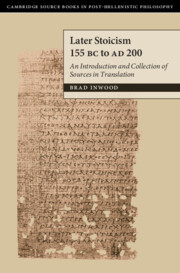2 results
Chapter 2 - Romanness and Greekness in Plutarch
-
-
- Book:
- The Cambridge Companion to Plutarch
- Published online:
- 29 June 2023
- Print publication:
- 13 July 2023, pp 29-46
-
- Chapter
- Export citation

Later Stoicism 155 BC to AD 200
- An Introduction and Collection of Sources in Translation
-
- Published online:
- 30 April 2022
- Print publication:
- 19 May 2022

